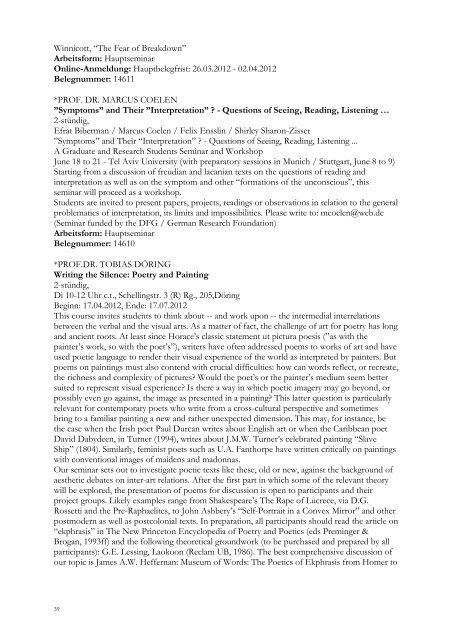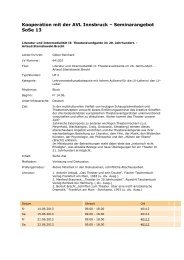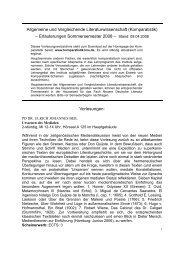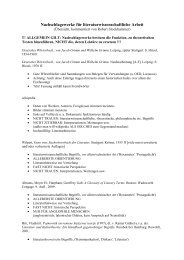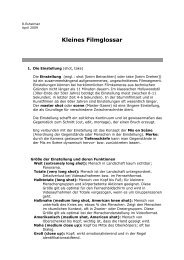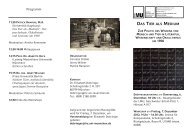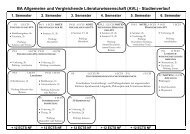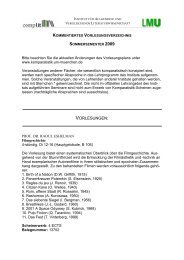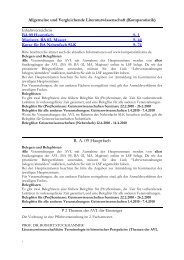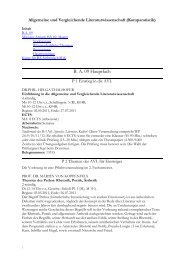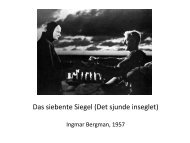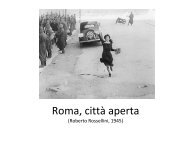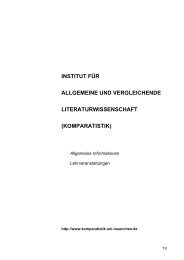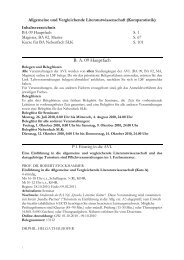Vorlesungsverzeichnis Sommersemester 2012 - Institut für ...
Vorlesungsverzeichnis Sommersemester 2012 - Institut für ...
Vorlesungsverzeichnis Sommersemester 2012 - Institut für ...
Sie wollen auch ein ePaper? Erhöhen Sie die Reichweite Ihrer Titel.
YUMPU macht aus Druck-PDFs automatisch weboptimierte ePaper, die Google liebt.
Winnicott, “The Fear of Breakdown”<br />
Arbeitsform: Hauptseminar<br />
Online-Anmeldung: Hauptbelegfrist: 26.03.<strong>2012</strong> - 02.04.<strong>2012</strong><br />
Belegnummer: 14611<br />
*PROF. DR. MARCUS COELEN<br />
”Symptoms” and Their ”Interpretation” ? - Questions of Seeing, Reading, Listening …<br />
2-stündig,<br />
Efrat Biberman / Marcus Coelen / Felix Ensslin / Shirley Sharon-Zisser<br />
”Symptoms” and Their “Interpretation” ? - Questions of Seeing, Reading, Listening ...<br />
A Graduate and Research Students Seminar and Workshop<br />
June 18 to 21 - Tel Aviv University (with preparatory sessions in Munich / Stuttgart, June 8 to 9)<br />
Starting from a discussion of freudian and lacanian texts on the questions of reading and<br />
interpretation as well as on the symptom and other “formations of the unconscious”, this<br />
seminar will proceed as a workshop.<br />
Students are invited to present papers, projects, readings or observations in relation to the general<br />
problematics of interpretation, its limits and impossibilities. Please write to: mcoelen@web.de<br />
(Seminar funded by the DFG / German Research Foundation)<br />
Arbeitsform: Hauptseminar<br />
Belegnummer: 14610<br />
*PROF.DR. TOBIAS DÖRING<br />
Writing the Silence: Poetry and Painting<br />
2-stündig,<br />
Di 10-12 Uhr c.t., Schellingstr. 3 (R) Rg., 205,Döring<br />
Beginn: 17.04.<strong>2012</strong>, Ende: 17.07.<strong>2012</strong><br />
This course invites students to think about -- and work upon -- the intermedial interrelations<br />
between the verbal and the visual arts. As a matter of fact, the challenge of art for poetry has long<br />
and ancient roots. At least since Horace’s classic statement ut pictura poesis (”as with the<br />
painter’s work, so with the poet’s”), writers have often addressed poems to works of art and have<br />
used poetic language to render their visual experience of the world as interpreted by painters. But<br />
poems on paintings must also contend with crucial difficulties: how can words reflect, or recreate,<br />
the richness and complexity of pictures? Would the poet’s or the painter’s medium seem better<br />
suited to represent visual experience? Is there a way in which poetic imagery may go beyond, or<br />
possibly even go against, the image as presented in a painting? This latter question is particularly<br />
relevant for contemporary poets who write from a cross-cultural perspective and sometimes<br />
bring to a familiar painting a new and rather unexpected dimension. This may, for instance, be<br />
the case when the Irish poet Paul Durcan writes about English art or when the Caribbean poet<br />
David Dabydeen, in Turner (1994), writes about J.M.W. Turner’s celebrated painting “Slave<br />
Ship” (1804). Similarly, feminist poets such as U.A. Fanthorpe have written critically on paintings<br />
with conventional images of maidens and madonnas.<br />
Our seminar sets out to investigate poetic texts like these, old or new, against the background of<br />
aesthetic debates on inter-art relations. After the first part in which some of the relevant theory<br />
will be explored, the presentation of poems for discussion is open to participants and their<br />
project groups. Likely examples range from Shakespeare’s The Rape of Lucrece, via D.G.<br />
Rossetti and the Pre-Raphaelites, to John Ashbery’s “Self-Portrait in a Convex Mirror” and other<br />
postmodern as well as postcolonial texts. In preparation, all participants should read the article on<br />
“ekphrasis” in The New Princeton Encyclopedia of Poetry and Poetics (eds Preminger &<br />
Brogan, 1993ff) and the following theoretical groundwork (to be purchased and prepared by all<br />
participants): G.E. Lessing, Laokoon (Reclam UB, 1986). The best comprehensive discussion of<br />
our topic is James A.W. Heffernan: Museum of Words: The Poetics of Ekphrasis from Homer to<br />
39


